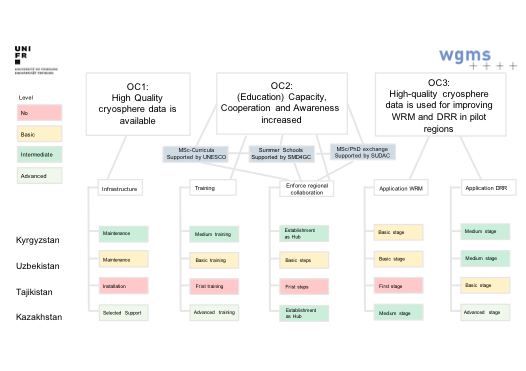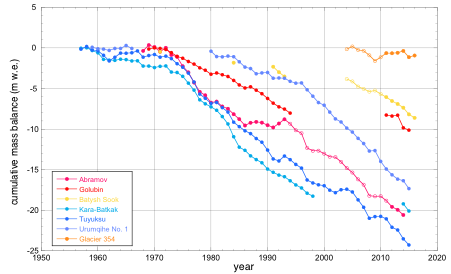Cryospheric Climate Services for improved Adaptation (CICADA)
Climate change poses a major challenge for humanity and the related global implications will influence and threaten future economies and livelihood of coming generations, especially in developing countries (IPCC 2013).
The UN General Assembly agreed upon 17 Sustainable Development Goals (SDGs) and related Targets, which represent an overarching framework for the implementation of the Paris Agreement at the 21st Conference of the Parties of the UN Framework Convention on Climate Change (UNFCCC). However, large efforts are needed to reach the SDGs and the 2°C (or 1.5°C)-atmospheric warming target within a time frame that prevents major drawbacks for humanity. Therefore, monitoring and strategies to enforce climate resilience, mitigation as well as adaptation must be based on sound baseline information, such as climate observations, and in particular, the Essential Climate Variables (ECVs) defined by the Global Climate Observing System (GCOS) (GCOS 2010). As stated by the World Meteorological Organization (WMO), large gaps currently exist in the global climate observing system. Especially in developing and emerging countries such baseline data are missing but fundamental to plan and mitigate future developments.
One region, where climate change has major impacts, is Central Asia (SDC 2012). With the Tien Shan and Pamir, the region contains two of the largest mountain systems of the world, which serve as water towers in arid and continental region (Immerzeel et al. 2010, Kaser et al. 2010). They store enormous amounts of water in form of glacier ice and ice embedded in permafrost. These resources will play an important role for future water availability under the ongoing climate warming influencing future water resource management. Several recent studies (Hagg et al. 2006, 2007, 2013, Braun and Hagg 2009, Kaser et al. 2010, Huss et al. 2008, Huss 2011) point out clearly that a) in arid regions like Central Asia, water release by glaciers is fundamental to keep runoff sufficient during the dry summer months and b) at the end of this century the water contribution of glaciers will be drastically reduced and certain catchment will completely dry-out. However, water resources are unevenly distributed and mainly controlled by upstream countries, - Kyrgyzstan and Tajikistan. At the same time, downstream Kazakhstan, Uzbekistan and Turkmenistan are the main consumers of water resources (UNDP 2011). Since the collapse of the Soviet Union in the early 1990s this setting causes political tensions and creates a complex set of future challenges in the areas of water management, energy production, irrigation, agriculture, environment, disaster risk reduction, security and public health. Notably this also poses challenges in the field of climate services, as, on one hand, each project target country underlines the necessity in sharing the baseline data and elaboration of the complex regional climate mitigation strategies, but on the other hand, the lack of reliable data and commitment of the governments to fully integrate their observatory systems inhibits the sustainable development of the region.
To improve the complex cooperation on climate data between stakeholders in Central Asia, sound and high-quality information on the climate and hydrological system are needed in order to provide climate scenarios and services for water runoff and natural hazards (e.g. GLOFs, debris flows and landslides). This is a prerequisite to allow early planning and adaptation measures within the water resource management (WRM) and disaster risk reduction (DRR) sectors. These scenarios and services have to be based on calibrated models linked to high quality baseline data. Therefore, baseline data has to be made available, especially for the most important alpine cryospheric variables such as snow, glaciers and permafrost as they are major controlling factors of the hydrological cycle in the region.
Improving regional dialogue for the review of baseline data on hydrological systems, forecasting and knowledge sharing, as well as scientific research and enhanced education at all levels were proposed too. It was emphasized that there is a need for a better cooperation among the international data users and the scientific community in the target region. There is an urgent need to make climate information available to all stakeholders and decision-makers in order to provide better policy advice. As the prerogative for effective scientific cooperation and sustainability in advancing research on climate change impact regarding in particular glacier melt, water resources and the associated natural hazards in the region, enhanced capacity building for the local staff in research institutions has been identified as crucial. Enhanced capacity contributes importantly to the process of raising the awareness towards the impacts of climate change not only of stakeholders and decision-makers but also of the population (Nussbaumer et al. 2017). In combination with high quality baseline data, the complex cooperation around climate services between the different stakeholders will be improved and consequentially enable a fast and effective mitigation process to impacts related on water availability and disaster risk reduction to finally enhance the resilience of the most vulnerable population.
Aims:
The project CICADA aims on
- the development of high-quality cryosphere data
- to increase(education) capacity, cooperation and awareness
- to use high quality cryosphere data for improving WRM and DRR in pilot regions
-
Illustrations
(Re-)established monitoring sites
Cumulative mass balance observations in Central Asia.
-
Publications
- HOELZLE, M., AZISOV, E., BARANDUN, M., HUSS, M., FARINOTTI, D., GAFUROV, A., HAGG, W., KENZHEBAEV, R., KRONENBERG, M., MACHGUTH, H., MERKUSHKIN, A., MOLDOBEKOV, B., PETROV, M., SAKS, T., SALZMANN, N., SCHÖNE, T., TARASOV, Y., USUBALIEV, R., VOROGUSHYN, S., YAKOVLEV, A., and ZEMP, M., 2017, Re-establishing glacier monitoring in Kyrgyzstan and Uzbekistan, Central Asia: Geoscientific Instrumentations, Methods and Data Systems, v. 6, p. 297-418.
-
Hoelzle, M., Barandun, M., Bolch, T., Fiddes, J., Gafurov, A., Muccione, V., Saks, T., Shaghedanova, M., (2019) The Status and Role of the alpine Cryosphere in the Aral Sea Basin, in: Xenarios, S., Schmidt-Vogt, D., Qadir, M., Janusz-Pawletta, B., Abdullaev, I. (Eds.), The Aral Sea Basin: Water for Sustainable Development in Central Asia. Routledge Publisher.
Duration: 2017-2021
Funded by: The project CICADA is mainly financed by the University of Fribourg with a remarkable contribution of Swiss Agency for Development and Cooperation SDC and is running under auspice of the World Glacier Monitoring Service.
Collaborators: Martin Hoelzle (Prof, UniFR), Bolot Moldobekov (Director, CAIAG), Ryskul Usubaliev (Senior Scientist, CAIAG), Maxim Petrov (Senior Scientist, ), Tomas Saks (Senior Scientist, UniFR), Horst Machguth (Senior Scientist, UniFR, UZH), Nadine Salzmann (Senior Scientist, UnifFR), Abror, Gafurov (Senior Scientist, GFZ), Sergiy Vorogushin (Senior Scientist, GFZ), Aleksandr Merkushkin (Senior Scientist, UNDP, Uzbekistan), Michael Zemp (Director, WGMS UZH), Martina Barandun (PhD student, UniFR), Marlene Kronenberg (PhD student, UniFR), Erlan Azisov (PhD, CAIAG), Ruslan Kenzhebaev (MSc, CAIAG), Alyssa Ghirlanda (MSc, UniFR).
Contact
Prof. Martin Hoelzle
Geography
Department of Geosciences
University of Fribourg
Chemin du Musée 4
CH–1700 Fribourg
+41 26 300 90 21



